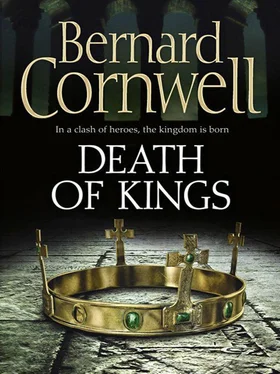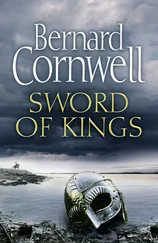‘I will.’
‘And you, Lord Æthelnoth?’
‘Gladly.’
‘Then the abbot is charged with discovering the boundaries according to the proper writs,’ Asser said, and the clerks scratched his words, and the council moved on to discuss other matters and I saw Alfred look wearily towards the man copying the document at the desk. The man had finished, because he sanded the parchment, waited a few heartbeats and then blew the sand into the fire. He folded the parchment and wrote something on the folded side, then sanded and blew again. A second clerk brought a candle, wax and a seal. The finished document was then carried to the king’s bed, and Alfred, with great effort, signed his name and then beckoned that Bishop Erkenwald and Father Beocca should add their signatures as witnesses to whatever it was he had signed.
The council fell silent as this was done. I assumed the document was the king’s will, but once the wax had been impressed with the great seal, the king beckoned to me.
I went to his bedside and knelt. ‘I have been granting small gifts as remembrances,’ Alfred said.
‘You were ever generous, lord King,’ I lied, but what else does one say to a dying man?
‘This is for you,’ he said, and I heard Ælswith’s sharp intake of breath as I took the newly written parchment from her husband’s feeble hand. ‘Read it,’ he said, ‘you can still read?’
‘Father Beocca taught me well,’ I said.
‘Father Beocca does all things well,’ the king said, then moaned with pain, which caused a monk to go to his side and offer him a cup.
The king sipped, and I read. It was a charter. The clerk had copied much of it, for one charter is much like another, but this one took my breath away. It granted me land, and the grant was not conditional, like that which Alfred had once used to give me an estate at Fifhiden. Instead it conveyed the land freely to me and to my heirs or to whoever else I chose to grant that land, and the charter laboriously described the boundaries of the land, and the length of that description told me that the estate was wide and deep. There was a river and orchards and meadows and villages, and a hall at a place called Fagranforda, and all of it in Mercia. ‘The land belonged to my father,’ Alfred said.
I did not know what to say, except to utter thanks.
The feeble hand stretched towards me and I took it. I kissed the ruby. ‘You know what I want,’ Alfred said. I kept my head bowed over his hand. ‘The land is given freely,’ he said, ‘and it will give you wealth, much wealth.’
‘Lord King,’ I said, and my voice faltered.
His feeble fingers tightened on my hand. ‘Give something back to me, Uhtred,’ he said, ‘give me peace before I die.’
And so I did what he wanted, and what I did not wish to do, but he was dying, and he had been generous at the end, and how can you slap a man who is in his last days of life? And so I went to Edward and I knelt to him, and I put my hands between his and I swore the oath of loyalty. And some in the hall applauded while some stayed resolutely silent. Æthelhelm, the chief adviser in the Witan, smiled, for he knew I would now fight for Wessex. My cousin Æthelred shuddered, for he knew he would never call himself king in Mercia so long as I did Edward’s will, while Æthelwold must have wondered if he would ever take Alfred’s throne if he had to fight his way past Serpent-Breath. Edward pulled me to my feet and embraced me. ‘Thank you,’ he whispered. That was Wednesday, Woden’s Day, in October, the eighth month of the year, which was 899.
The next day belonged to Thor. The rain did not stop, coming in huge swathes that swept across Wintanceaster. ‘Heaven itself is weeping,’ Beocca told me. He was crying himself. ‘The king asked me to give him the last rites,’ he said, ‘and I did, but my hands were shaking.’ It seemed Alfred received the last rites at intervals through the day, so intent was he on making a good end, and the priests and bishops vied with each other for the honour of anointing the king and placing a piece of dry bread between his lips. ‘Bishop Asser was ready to give the viaticum ,’ Beocca said, ‘but Alfred asked for me.’
‘He loves you,’ I said, ‘and you’ve served him well.’
‘I have served God and the king,’ Beocca said, then let me guide him to a seat beside the fire in the great room of the Two Cranes. ‘He took some curds this morning,’ Beocca told me earnestly, ‘but not many. Two spoonfuls.’
‘He doesn’t want to eat,’ I said.
‘He must,’ Beocca said. Poor dear Beocca. He had been my father’s priest and clerk, and my childhood tutor, though he had abandoned Bebbanburg when my uncle usurped its lordship. He was low-born and ill-born, with a pathetic squint, a misshapen nose, a palsied left hand and a club foot. It was my grandfather who saw the boy’s cleverness and had him educated by the monks at Lindisfarena, and Beocca became a priest and then, following my uncle’s treachery, an exile. His cleverness and his devotion had attracted Alfred, whom Beocca had served ever since. He was old now, almost as old as the king, and his straggly red hair had turned white, his back was bent, yet he still had a keen mind and a strong will. He also had a Danish wife, a true beauty, who was the sister of my dearest friend, Ragnar.
‘How is Thyra?’ I asked him.
‘She is well, thanks be to God, and the boys! We’re blessed.’
‘You’ll be blessed and dead if you insist on walking the streets in this rain,’ I said. ‘No fool like an old fool.’
He chuckled at that, then made a small impotent protest when I insisted on taking his sopping wet cloak and placing a dry one around his shoulders. ‘The king asked me to come to you,’ he said.
‘Then the king should have told me to go to you,’ I said.
‘Such a wet season!’ Beocca said. ‘I haven’t seen rain like this since the year Archbishop Æthelred died. The king doesn’t know it’s raining. Poor man. He strives against the pain. He can’t last long now.’
‘And he sent you,’ I reminded him.
‘He asks a favour of you,’ Beocca said, with a touch of his old sternness.
‘Go on.’
‘Fagranforda is a great estate,’ Beocca said, ‘the king was generous.’
‘I have been generous to him,’ I said.
Beocca waved his crippled left hand as if to dismiss my remark. ‘There are presently four churches and a monastery on the estate,’ he went on crisply, ‘and the king has asked for your assurance that you will maintain them as they should be maintained, as their charters demand, and as is your duty.’
I smiled at that. ‘And if I refuse?’
‘Oh please, Uhtred,’ he said wearily. ‘I have struggled with you my whole life!’
‘I will tell the steward to do all that is necessary,’ I promised.
He looked at me with his one good eye as if judging my sincerity, but seemed pleased with what he saw. ‘The king will be grateful,’ he said.
‘I thought you were going to ask me to abandon Æthelflaed,’ I said mischievously. There were few people I would ever talk to about Æthelflaed, but Beocca, who had known me since I was a stripling, was one.
He shuddered at my words. ‘Adultery is a grievous sin,’ he said, though without much passion.
‘A crime too,’ I said, amused. ‘Have you told that to Edward?’
He flinched. ‘That was a young man’s foolishness,’ he said, ‘and God punished the girl. She died.’
‘Your god is so good,’ I said caustically, ‘but why didn’t he think to kill her royal bastards as well?’
‘They have been put away,’ he said.
‘With Æthelflaed.’
He nodded. ‘They kept her from you,’ he said, ‘you know that?’
Читать дальше
Конец ознакомительного отрывка
Купить книгу












